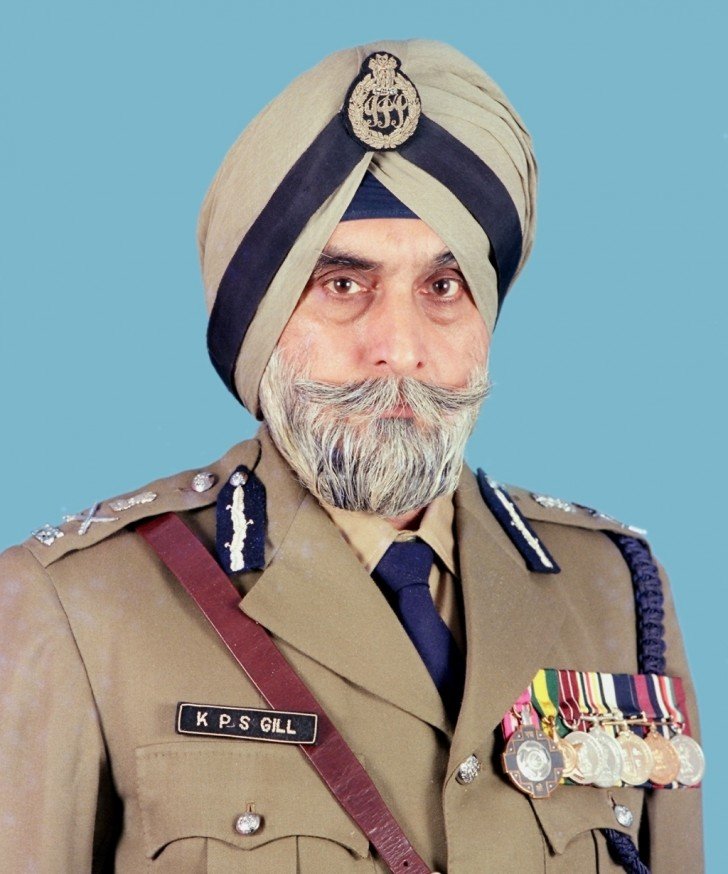America
The 'Supercop' who pacified Punjab and his controversial career (Obituary)
By
Vikas Datta
Hailed by many as a "Supercop" who ruthlessly stamped out terrorism from Punjab in the 1990s, K.P.S. Gill had an equal number of detractors who slammed his "high-handedness" and alleged human rights violations in his campaign against Khalistani militancy.
The stern-looking, impressively-moustachioed Gill, who was brought to the state from the northeast in 1984 after "Operation Blue Star", was no stranger to controversy -- ranging from the incompetence charge levied against him by one of his predecessors to the infamous incident involving woman bureaucrat Rupen Deol Bajaj in 1988.
Even after his retirement, he figured in the headlines for both the right and wrong reasons. Eagerly sought as security advisor by various states, and even neighbouring countries like Sri Lanka, facing militancy, he remained critical of prevailing security policies -- or lack thereof.
His stewardship of the Indian Hockey Association also came under a cloud after the national team failed to qualify for the Olympics for the first time in 2008. Adding to the indignity, he was denied permission to attend the 2012 London Olympics after a successful canvassing by a Britain-based human rights group.
But it was his police career that defines Kanwar Pal Singh Gill.
Born in Ludhiana in 1935, Gill did his masters in English from Shimla's St Edmunds. Joining the Indian Police Service in 1958 and being posted to the Assam-Meghalaya cadre, he spent the next quarter century in the northeast. But there also he got embroiled in controversy to the extent that, in 2003, then Assam Chief Minister Tarun Gogoi declined a proposal to make him the state Governor.
Gill, who headed the Assam Police when the anti-foreigners agitation was at its height, seemed to have put off many people there with his brusque style. He was also charged with beating a prisoner to death but was exonerated in the case by the Supreme Court.
It was Punjab that made his name. Deputed to the state in the wake of the situation spiralling out of control after Operation Blue Star, which he confessed had also hurt him, Gill did not get on very well with the new police chief Kirpal Dhillon.
Breaking his silence on his subordinate in his book "Identity and Survival: Sikh Militancy in India 1978-1993", Dhillon, who was brought in from Madhya Pradesh but eased out most unceremoniously after an year in the post, accused both his successors Julio Ribeiro and Gill of "strategies that tended to promote a culture of illegitimate, brutal and possibly venal policing among their subordinates".
Dhillon, in his 2013 autobiography "Time Present and Time Past", went further, blaming Gill's decisions and "perceived incompetence" for Sant Longowal's assassination soon after the signing of the August 1985 Punjab Accord with Prime Minister Rajiv Gandhi. It was this event that lay behind Dhillon's removal.
After coming to prominence with "Operation Black Thunder" in 1987 when armed Khalistani militants, who again ensconced themselves in the Golden Temple, were made to surrender without any damage to the structure, Gill became Punjab Police chief in 1988 -- when the situation was at its nadir with thousands attending the rituals of killed militants.
However, he only hit his peak in his second tenure in the post that began in 1991, when the new Congress government, headed by Beant Singh, gave Gill a free hand and he, in turn, unleashed his subordinates.
Bounties were placed on militants, kidnappings reportedly curbed by identifying those responsible and picking up their relatives, and under "Operation Night Dominance" the entire police force brought out at night to challenge the terrorists with innovations like armoured tractors to chase them across crop fields.
Inevitably, there were extra-judicial killings, innocents got caught in the crossfire, a few human rights activists went missing in suspicious circumstances and his comments and actions -- offering to help the Uttar Pradesh Police clean up the Terai of Sikh militants and the killing of suspected terrorists in Kolkata -- riled many.
But by 1993 and 1994, there was more peace in Punjab than had been seen in the previous two decades. There was a last high-profile sacrifice before the militancy was wiped out -- that of Beant Singh, blown up by a human bomb in the Secretariat at Chandigarh in September 1995, shortly before Gill's retirement.
After his retirement, Gill set up his institute on security matters and was consulted by various states, including Narendra Modi's Gujarat in the wake of the 2002 riots, and Maoist-affected Chhattisgarh in 2008, but he never made the same spark.

























